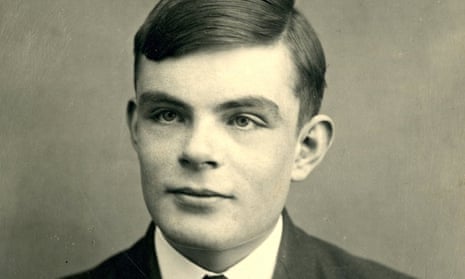The new £42m Alan Turing Institute for Data Science, dedicated to the second world war Enigma codebreaker, is to be based at the British Library at the centre of a new Knowledge Quarter, George Osborne announced on Thursday.
The location of the world-class research institute, which will focus on the rapidly moving and globally competitive area of collecting and analysing so-called “big data”, was announced as the chancellor launched the Knowledge Quarter, a partnership of 35 academic, cultural, research, scientific and media organisations in and around the King’s Cross and Euston area of the capital.
First announced at this year’s budget, the institute will have links with universities across the UK. It will be at the heart of the new Knowledge Quarter, which encompasses knowledge resources and expertise that range from the world’s earliest books and manuscripts to the latest fashion designs and the cutting edge of medical research.
The one-mile radius around King’s Cross now forms one of the greatest concentrations of knowledge-based institutions in the world, said Osborne. “30 or 40 years ago, this was an area of London in decline, and when you look at all the exciting things happening here – the British Library, the renovation of King’s Cross, the arrival of great companies like Google and Guardian Media Group, the universities based here – it is really one of the most exciting places in the world. And it returns this area to what it was 100 or 150 years ago, when it was a centre of modern communication and modern learning,” he said.
Partners include the British Library, Google, the Wellcome Trust, Camden Council, the British Museum, Central Saint Martins, University College London, the Francis Crick Institute, the Royal College of Physicians as well as the Guardian, and its members employ more than 30,000 people, turnover more than £2bn and serve more than 8 million visitors annually.
Turing was “a great figure” and “a national hero” who was “not only the father of modern computing science” but also had the rare distinction “of probably having saved more lives than anyone else in history” by bringing about a speedier end to the second world war, he said. Yet, he had been “treated very badly by the country he had helped save, was prosecuted for his homosexuality and committed suicide”.
“I think it is a fitting tribute to his name and memory that here, in the centre of our capital, there is an institute that is named after him”.
Roly Keating, chief executive of the British Library and chair of the Knowledge Quarter, said he was “delighted” the British Library had been selected by the Engineering and Physical Sciences Research Council as the location for the institute.
Of the Knowledge Quarter, he said: “I think it is fair to say that 30 or 35 years ago when it was announced that the British Library was going to be plonked on some old railway yards north of the Euston Road, it was seen as, to put it politely, an odd idea. Flash forward to now and the sheer revolution that has happened here, we no longer feel on the edge of something, we feel and are at the centre of it”.
Within a mile or so, he said “is probably the greatest single concentration of cultural, research and knowledge institutions anywhere in Europe and possibly in the world”, who were coming together to be “very much more than the considerable sum of our parts”.







